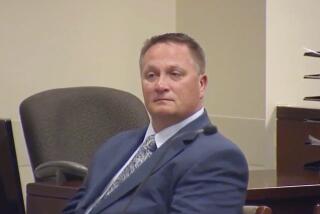Nurse Battles Euthanasia Accusation
- Share via
OGDENSBURG, N.Y. — Willis Dobisky wheezed stubbornly, her chest moving in tortured upheavals as her body fought between life and death.
Frank Dobisky watched his mother’s struggle for nearly 24 hours, all the time pleading with her caretakers to give her medicine to ease her pain.
Like an angel of mercy, says Dobisky, nurse Sharon LaDuke stood up against negligent, uncaring hospital staff to help his 76-year-old mother die comfortably, with dignity.
Hepburn Medical Center officials, however, branded her “Nurse Kevorkian” and said she caved in to the family’s pressure and euthanized Dobisky. They fired her and asked a district attorney to prosecute her as a killer.
Although she was cleared of any wrongdoing by the prosecutor and found blameless by the state Department of Health and a peer panel, LaDuke’s fight with the hospital continues, more than three years after Dobisky’s demise.
LaDuke has sued the 149-bed hospital to regain her job and for slandering her. The hospital also faces a medical malpractice suit from the Dobiskys, a prominent family in this St. Lawrence River port town along the U.S.-Canadian border.
“Essentially the family was being forced to watch their mother disintegrate as she died, and that’s just not necessary in this day and age,” said LaDuke, 44, a nurse with 15 years’ experience who managed Hepburn’s critical care unit.
Carrying out a doctor’s orders, LaDuke gave Dobisky Fentanyl, a narcotic, that would quiet her breathing--and hasten her death. When the first dosage didn’t work sufficiently, LaDuke--again with a doctor’s order--gave her a second.
Dobisky died quietly within minutes.
Distraught over Dobisky’s death and her role in it, LaDuke discussed her concerns--in confidence, or so she thought--with her immediate supervisor, Carol Sutkus, the hospital’s vice president for patient care.
The next thing LaDuke knew, the hospital was investigating her.
“I said I felt like I may have euthanized her. In hindsight, it was a poor choice of words,” said LaDuke, who chose critical care nursing after watching her dying father languish for 30 days after heart surgery.
“The hospital misconstrued my statements in the most outrageous fashion. They just latched onto that word and ran with it,” LaDuke said. She has since been hired as a nursing supervisor by Massena Memorial Hospital.
Hospital administrators have no comment about the dispute, said Paul Brounsdorf, an attorney whose Rochester-based firm represents Hepburn. Dr. William DeTorres, Dobisky’s physician, also declined comment.
It should be no surprise that LaDuke experienced feelings of guilt and doubt, said Dr. Kathleen McCarty, a psychiatrist who established a palliative care program at UCLA Medical Center before starting a private practice in Tampa, Fla.
“It’s not easy to take care of a dying person. That’s why it’s a specialty and requires expertise,” McCarty said.
“Any time a patient dies, a physician or nurse will feel guilt. They’ve lost the fight against death. They’ve failed. The feelings may be irrational, but they are normal,” McCarty said.
Although LaDuke’s case is extraordinary, it should not be unexpected in the contemporary U.S. medical system, said geriatrician Joanne Lynn, the director of the Center to Improve Care of the Dying at George Washington University in Washington.
“We have built a care system that’s designed around prolonging life, even in the most hopeless situations,” said Lynn. “We have done so little to serve the dying.”
Even Dr. Timothy Quill, the Rochester physician whose landmark assisted-suicide case was argued before the U.S. Supreme Court in January, recently said that physician-assisted suicide exists primarily because of poor care provided for the dying.
Quill first gained notoriety in 1991 when he published an article in the New England Journal of Medicine admitting that he had helped one of his patients die by giving her enough barbiturates to commit suicide.
In New York, a state commission is studying ways to improve care for the dying.
Willis Dobisky was rushed by ambulance to Hepburn on Dec. 31, 1993, suffering from emphysema, glaucoma and a weak heart. The town’s community center bears the name of her late husband, Edwin, a longtime Chamber of Commerce president.
The family has said that if it wins its $4-million lawsuit against the hospital, it will use the money to open a hospice center for the terminally ill at Hepburn.
While still healthy, Dobisky had written an advance care directive--a document that details the type of treatment she wished to receive in the event of a terminal illness.
But in the chaos of her admission that day, Hepburn administrators said they couldn’t find Dobisky’s instructions in their files, a mistake they were eventually faulted for by state regulators. Besides, Hepburn officials said, Dobisky gave her verbal permission to be placed on a ventilator.
“The problem was my mother was in no condition to make this decision unilaterally,” Frank Dobisky said.
After 10 days on life support, the family met with the doctor and LaDuke and decided to take her off the respirator. Dobisky was to be given medication to ease any final suffering, the family believed.
Instead of passing quickly, Dobisky fended off death for nearly 24 hours.
“She was struggling. It was tough for us to watch,” said Frank Dobisky.
The Dobisky children asked nurse Terry Rand to help their mother, but Rand said Dobisky was not in pain and she refused to give her pain medication because it could hasten her death, Rand said in court papers.
Robert Dobisky, another son, said Hepburn medical staff “abandoned” his mother.
In retort, Hepburn administrator Donald Lewis accused the family of becoming “agitated over the length of time it was taking her to die” and said her relatives pressured nurses to euthanize her.
In an affidavit, Lewis said LaDuke “was basically placing the family’s interest over those of the patient.”
Meanwhile, the experts fear that LaDuke’s case presents worrisome ramifications, such as nurses second-guessing themselves and questioning whether to honor a patient’s instructions.
“Events like this will have a chilling effect,” McCarty said. “These situations are difficult enough already . . . nurses need to be supported when they do the right thing.”
More to Read
Sign up for Essential California
The most important California stories and recommendations in your inbox every morning.
You may occasionally receive promotional content from the Los Angeles Times.










